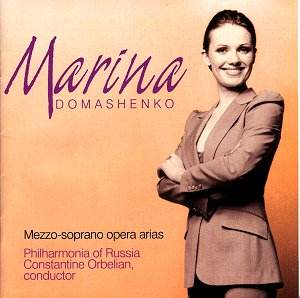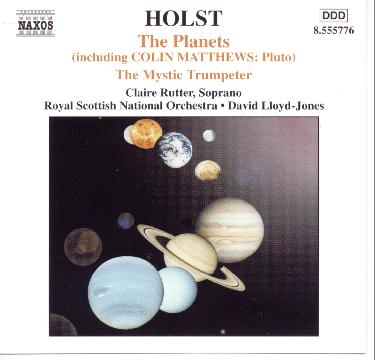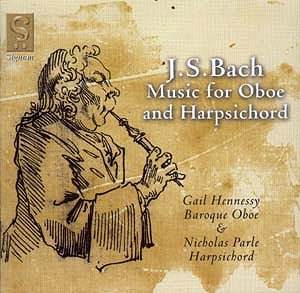 Composer: Domashenko
Composer: Domashenko
Works: Francesco CILEA: Adriana Lecouvreur: Acerba voluttà; Camille SAINT-SAËNS: Samson et Dalila: Mon coeur s’ouvre à ta voix, Amour! Viens aider ma faiblesse, Printemps qui commence; Modest MUSSORGSKY: Khovanschina: Marfa’s fortune-telling scene; Nicolai RIMSKY-KORSAKOV: The Tsar’s Bride: Lyubasha’s Arioso, The Snow Maiden: Lel’s Third Song; Sergei PROKOFIEV: Alexander Nevsky: Field of the Dead; Amilcare PONCHIELLI: La Gioconda: Stella del marinar!; Giuseppe VERDI: Il Trovatore: Stride la vampa; Georges BIZET: Carmen: L’amour est un oiseau rebelle (Habanera), Près des ramparts de Séville (Seguidilla), Carreau! Pique! (Card Scene); Gioachino ROSSINI: L’Italiana in Algeri: Cruda sorte! Amor tiranno!; Johann STRAUSS II: Die Fledermaus: Ich lade gern mir Gäste ein!
Performers: Marina Domashenko (mezzo-soprano), Philharmonia of Russia/Constantine Orbelian
Recording: 31 March, 4, 8, 9, 11, 12 April 2001, Great Hall, Moscow Conservatoire
Label: DELOS DE 3285
Marina Domashenko’s debut album showcases her formidable talents while navigating the rich landscape of operatic arias from the late 19th and early 20th centuries. This collection, which features works by composers ranging from Cilea to Strauss, presents not only a display of her vocal prowess but also serves as a testament to the enduring power of the operatic canon. The selected repertoire provides a diverse range of emotional palettes and technical challenges that highlight Domashenko’s capabilities as a dramatic mezzo-soprano.
Domashenko’s voice resonates with a strikingly even timbre, carefully crafted through her extensive training and performance experience. Her interpretation of Cilea’s “Acerba voluttà” demonstrates a commendable ability to convey the anguish and yearning embedded in the text, though it occasionally lacks the haunting depth that seasoned interpreters like Maria Callas brought to the role of Adriana. Nevertheless, her fine high B is a testament to her technical facility. The contrasting demands of Saint-Saëns’ “Mon coeur s’ouvre à ta voix” reveal her agility; she navigates the lyrical lines with grace, although one yearns for a greater emotional weight behind her phrasing, something that could elevate her performance from competent to compelling.
The recording quality is generally superb, capturing Domashenko’s voice in a warm, resonant space that enhances her rich tonal qualities. The Philharmonia of Russia, under Constantine Orbelian’s direction, is responsive and vibrant, with orchestral textures that both support and complement the soloist. However, the ensemble occasionally lacks the dramatic intensity that could elevate the climaxes of pieces like Prokofiev’s “Field of the Dead,” where one wishes for more visceral engagement from both the orchestra and the singer.
In the realm of comparison, while Domashenko’s interpretations may not yet rival the iconic performances of her predecessors, her artistry suggests a promising trajectory. The agility required for Rossini’s “Cruda sorte! Amor tiranno!” is skillfully handled, though she has yet to imbue it with an individual interpretative stamp that could distinguish her from her contemporaries. Moreover, her rendition of Bizet’s Habanera lacks the sultry magnetism that is the hallmark of great interpreters, leaving a sense of potential unfulfilled.
The album ultimately serves as both an introduction to Domashenko’s artistry and a reflection of her burgeoning career. With her solid technical foundation and rich vocal color, she possesses the essential qualities to evolve into a significant operatic presence. As she continues to refine her interpretative skills and deepen her emotional connection to the music, audiences can anticipate the emergence of a voice that will resonate powerfully within the operatic world. This recording is a commendable first step, albeit one that hints at even greater possibilities yet to come.



